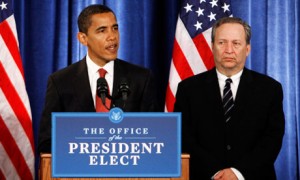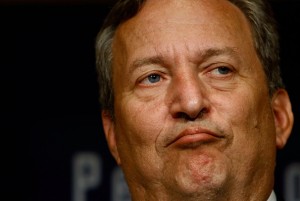Obama considering Larry Summers for World Bank Chief
Bloomberg:President Barack Obama is considering nominating Lawrence Summers, his former National Economic Council director, to lead the World Bank when Robert Zoellick’s term expires later this year, according to two people familiar with the matter.
Summers has expressed interest in the job to White House officials and has backers inside the administration, including Treasury Secretary Timothy Geithner and current NEC Director Gene Sperling, said one of the people. Secretary of State Hillary Clinton is also being considered, along with other candidates, said the other person. Both spoke on condition of anonymity to discuss internal White House deliberations.
Lael Brainard, the Treasury undersecretary for international affairs, is compiling a list of potential candidates to replace Zoellick, who was nominated to a five-year term that began in July 2007 by then-President George W. Bush. By tradition, the U.S. president chooses the leader of the World Bank while the head of the International Monetary Fund is selected by European leaders. The nomination is subject to approval by the World Bank’s executive board.
White House press secretary Jay Carney declined to comment. Summers’ assistant, Julie Shample, said he was unavailable. Philippe Reines, a spokesman for Clinton, also declined to comment.
Scrutiny of Record
A nomination of Summers would bring scrutiny of his previous stints in government, both as former President Bill Clinton’s Treasury secretary and Obama’s NEC director, as well as his tenure as president of Harvard University.
“Larry is controversial,” said Erskine Bowles, who served as Clinton’s chief of staff. “Anything you appoint Larry to, you know there are going to be some people who are going to take shots at him. But you know he’s a brilliant economist, which I think everybody recognizes.”
Bowles said he had no information on the White House deliberations.
“He performed well in some difficult markets,” Bowles said. “I think it’s been a passion of his for a long, long time and I am confident that he will do a good job.”
Summers also may come under fire for some of his previous work at the bank, as well as the commercial relationships he has forged since leaving the White House in December 2010.
In 1991, at the World Bank, he signed off on a memo that argued that less-developed countries might benefit from accepting pollution from wealthy countries.

Larry Summers flanks Barack Obama at a press conference announcing the president's staff in November 2008.
Return to Harvard
After leaving the Obama administration, Summers, 57, returned to Harvard, where he’s now a professor at the John F. Kennedy School of Government.
Summers earned his doctorate in economics at Harvard in Cambridge, Massachusetts, and at 28 was granted tenure, the youngest age anyone had gained that status at the time. He spent time on the staff of the White House Council of Economic Advisers in the 1980s before joining the World Bank as chief economist.
He was Clinton’s Treasury secretary from 1999 to 2001, after which he became Harvard president. Summers quit that post in 2006 after a series of battles with the Faculty of Arts and Sciences, which teaches most of the undergraduate courses, and following a controversy over comments he made at a conference, in which he suggested women lacked an aptitude for science.
‘Supported Deregulation’
During the Clinton era, Summers argued for the deregulation of the financial industry and clashed with Brooksley Born, then head of the U.S. Commodity Futures Trading Commission, over the regulation of the over-the-counter derivatives market. Those positions, along with his speaking engagements at banks and work at a hedge fund, have made him unpopular with some Democrats.
In the 16 months before joining Obama’s White House, the hedge fund D.E. Shaw & Co. paid Summers more than $5 million, according to a 2009 financial-disclosure form.
“Summers is certainly a very smart economist,” said Dean Baker, who is co-director of the Center for Economic and Policy Research in Washington. “However, his track record in dealing with the U.S. economy has not been very good.”
Baker cited Summers’ support for deregulating the financial industry and said he “ ignored the stock bubble in the ‘90s and the housing bubble in the last decade.”
“And, he seems to have badly underestimated the severity of the downturn,” Baker said.
‘Global’ Experience
Summers’ ascension to the World Bank presidency would be cheered by Wall Street, said Ralph Schlosstein, chief executive officer at Evercore Partners Inc.
“He has a very strong set of global experiences, which are fundamental to being a great head of the World Bank,” Schlosstein said. “I think he has an open-mindedness and creativity that will probably be a tremendous asset in the challenging world we face over the next decade.”
Summers will also have his detractors, Schlosstein said, in part because of his interpersonal skills. “He doesn’t suffer fools graciously,” he said.
Under a longstanding unwritten agreement, the IMF has always been led by a European while the World Bank has been headed by an American. The U.S. in June backed then-French Finance Minister Christine Lagarde to take the head of the IMF. Emerging market leaders such as Brazilian Finance Minister Guido Mantega have questioned the division of leadership posts at the two institutions, saying the choice should be made on the basis of merit, not nationality.
Aid Channel
The World Bank, which was established to rebuild Europe after World War II, made loans worth about $57 billion in the year ended June 30. It offers financial and technical assistance to countries. Pakistan, for example, will receive up to $5.5 billion in grants and loans through mid 2015. The institution also has a private sector arm.
Under Zoellick, shareholders approved a capital increase providing the institution with $5.1 billion in cash to meet demand from countries hit by the global recession that followed the 2008 financial crisis.
The next World Bank president may yet face another increase in loan demand. Yesterday, the bank cut its global growth forecast by the most in three years and told developing countries to “prepare for the worst,” saying that Europe’s debt crisis still has the potential to trigger another global financial crisis.
Bloomberg news


April 2, 2012 at 10:34 pm
Good riddance. Geithner and Summers were Obama’s bsggeit mistakes. He was scared that the market would be spooked if he dumped. Hindsight is always 20/20, but I can tell you what I would have done if I had taken office last year.